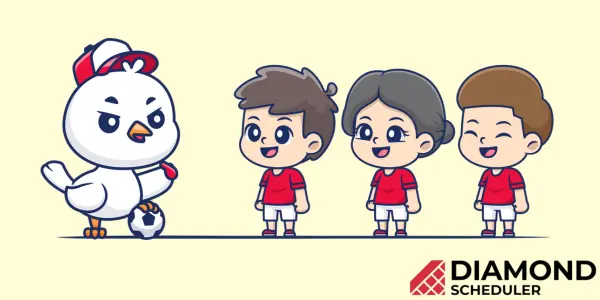
Athlete Motivation: What Inspires Athletes to Work Hard
Every serious athlete knows motivation is vital to keep them going in the journey of achieving their goals. Many athletes lose motivation, preventing them from training and working out to the best of their ability.
Losing motivation during the season is normal, and even professional athletes lose their motivation at some point. To get your athletes' motivation back on track, you need to find out what resources professional coaches use to encourage athletes of all disciplines.
In this article, we'll look at some of the most advanced and best motivational methods available for athletes to help them reach their goals. Both young and experienced athletes can gain something from these methods and get inspired to push their limits to victory.

What is athlete motivation?
Motivation is the driving force that helps athletes to focus and keep trying to improve their athletic abilities. Motivation is also the same drive that helps athletes to achieve the ultimate reward they are going for.
Not all athletes have the same goal, so they won't have the same inspiration to keep them going. Some athletes may just be playing to stay fit, some may want to lose weight and live healthier, and others have a professional goal.
Whether you're a recreational or a professional athlete, some motivation is needed to keep you going. If you're an athlete, you have a reward in mind when you take part in playing a sport.
Internal or external factors are always present as to why any athlete would want to participate in sports.
Your goal or purpose for playing sports will determine your motivation to succeed.
What drives athletes to compete?
Why does an athlete participate in that specific type of sport?
Do they like it, or is it all about a certain external reward? Many factors play into what drives athletes to compete.
There are also many different types of motivations that make an athlete train hard to achieve that goal. These factors may include different types of internal and external motivations and inspiration. Let’s take a closer look at the different types of motivation that contribute to an athlete's success.
Motivating young athletes: Igniting the fire within
The need to feel valued and skilled is a natural phenomenon for all humans, and this need can be a great motivational tool. Positive feedback from your coach or teammates can inspire and motivate athletes to achieve more.
This constructive feedback can be done by letting athletes know their strengths and what they are doing well. In turn, this can be reinforced with advice and motivation for individual improvement, which will help them succeed in whatever athletic activity they participate in.
Some factors, such as criticism and punishment, should be minimized to create an ideal environment for youth athletes. Rather use encouragement to rectify mistakes and change failure into learning moments on their path to achievement.
Powerful words of encouragement will help the athlete to feel accomplished and that they are valuable. Individual improvement can be achieved by rewarding the athlete when they are successful with every small or big achievement. Youth athletes benefit more from positive encouragement and rewards than from the opposite, like criticism and punishment.
Athletes who work hard and push themselves should be encouraged with rewards so they will feel fulfilled and successful. It is also important to encourage them to work with other athletes on the team to improve their sense of belonging.
Also, reward athletes who work well on the team with the purpose of helping each other and motivating their teammates. You will find that team bonding will improve, they will work much better together and enjoy working together while implementing their skills.
Motivation in sports: 3 science-backed theories
Motivation is a process in the mind of any person determined to reach a certain goal through action. Motivation greatly impacts how one thinks, feels, and interacts with others.
Within sports, there are three methods often used by experts to motivate athletes to improve with every practice session: the self-determination theory, intrinsic motivation, and extrinsic motivation.
What motivates marathon runners to take on the mountains ahead so they can get to the finish line first? Many professional athletes use social media to pressure themselves by posting their progress regularly for followers to see.
Athletes need to be motivated to keep practicing even when they don't feel like it. Many professional coaches use negative and positive reinforcement to motivate the athlete to perform better.
One method is to use the performances and achievements of predecessors in the same type of sports. If the athlete is a boxer, they can easily get inspiration from world champions like Mohammad Ali or Mike Tyson.
Let's take a closer look at the various theories and how they can be used to motivate athletes.
1. Self-determination theory
What does self-determination theory mean, and how does that help motivate any athlete to improve?
This theory has much to do with the athlete's behavior and how determined they are to achieve the ultimate goal.
The opposite is true when athletes are not inspired and can lose their motivation and give up.
Many factors can cause a loss of motivation, such as self-pity and failure.
Almost all athletes experience a time when they feel sorry for themselves, especially after losing to an opponent. Success does not come easy for most athletes, so they need some form of motivation to keep going and to bounce back after a loss.
This is where motivation can become a handy tool to keep an athlete from giving up on their goals.
The self-determination theory states that every athlete has three basic needs: competence, relatedness, and autonomy.
Competence: An athlete's effectiveness in a certain sport and their experience in mastering it.
Relatedness: The sense of belonging and being part of something greater than oneself, such as being part of a team in a certain sport.
Autonomy: Is the feeling any athlete has that they take part in an activity they prefer, so the choice is theirs alone.
Many things in life may get in the way of the components of self-determination that any athlete must overcome. These obstacles may be illness, injury, family, and/or many other social activities that are not in an athlete's control.
2. Intrinsic motivation theory
Intrinsic motivation refers to actions triggered by internal rewards that may come from inherent satisfaction.
An intrinsically motivated person is more likely to achieve their goal than one without motivation.
Three basic elements are involved in intrinsic motivation: purpose, autonomy, and mastery.
Intrinsically motivated athletes participate in their sports types because of an internal goal and inspiration to achieve that goal.
Intrinsic motivation can be to play a certain sport because of the fun factor involved, like volleyball on the beach.
Another intrinsic motivation can be the excitement it provides.
Overall, intrinsic motivation comes down to the emotional rewards the intrinsically motivated athlete will achieve.
3. Extrinsic motivation theory
On the other hand, extrinsic motivation is an action guided by an external reward, such as a trophy for the winner and/or money. There are many different types of extrinsic rewards athletes are inspired by to work harder, such as approval from others and more.
Recognition is one of the most popular inspirations for why extrinsically motivated athletes participate in an event. To be known as the winner or a legend is a reward in itself, and it will also provide praise from others and recognition.
An extraordinary achievement from athletes will provide them with the admiration of their peers and many supporters of that sport.
Another motivation for younger athletes is avoiding punishment, criticism, or even humiliation.
The intrinsically motivated athlete will be inspired to improve their performance and become better with every practice session.
Which is better for athletes? Intrinsic vs. extrinsic motivation
Extrinsic and intrinsic motivation are both great methods for every athlete to stay focused and work harder in what they do. We already discussed them in the previous section, but which one is better for athletes to improve on?
The simple answer is that intrinsic and extrinsic motivation goes hand in hand.
Extrinsic rewards, such as the vision of holding a trophy over your head, can bring a good spark of motivation. Intrinsic rewards are the fact that the athlete enjoys the activity and wants to be well-known in their sport. Both play a role in helping athletes achieve their goal.

Top 6 motivational quotes for athletes
Athletes can use many motivational quotes to get inspired to achieve their best.
Following are a few that can help motivate you and your athletes.
1. Without self-discipline, success is not possible. —Lou Holtz, former American football player
2. If you don't go all the way, why go? —Joe Namath, another former American football player
3. Don't let what you can't do interfere with what you can do. —John Wooden, former American basketball player and coach
4. Set your goals high, and don't stop till you get there. —Bo Jackson, former professional baseball player
5. It doesn't matter how far or how fast you're going; if you put on your running shoes to go for a run, you are a runner. —Kara Goucher, Olympic long-distance runner
6. I don't count the sit-ups. I only start counting when it starts hurting because they are the ones that count. That's what makes you a champion. —Mohammad Ali, former heavyweight world champion boxer
Frequently asked questions What is athlete motivation?
Motivation is the driving force that helps athletes to focus on the goals they want to achieve in their sport.
What are three methods used by experts to motivate athletes?
The three methods sports experts used to motivate athletes are self-determination theory, intrinsic motivation, and extrinsic motivation.
What are three basic needs of every athlete?
The three basic needs of every athlete are competence, relatedness, and autonomy.
Conclusion
Whether it’s the hardest goal you want to achieve or you just enjoy playing the game, motivation is what every athlete needs. Coaches and athletes will benefit from these methods to keep them going. We hope this also gave you insight into how you can perform at your best.
Thalia Oosthuizen has been writing in a professional capacity for over a decade. Her love for sports has led her down the path of sports writing, where her passion and skills combine. Thalia is a runner, cyclist, and swimmer, and enjoys playing tennis and hockey. Her favorite sports teams include Chelsea F.C. and the Georgian Lions Rugby Club.



